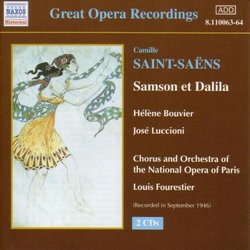Of historic and musical importance
F. Behrens | Keene, NH USA | 01/24/2001
(4 out of 5 stars)
"Opera or oratorio? That is always the question that comes up in any discussion of Saint-Saens' . Well, when the Metropolitan Opera produced it as a salute to their faithful Placido Domingo, it looked like a rejected episode of "Star Trek"; and some recordings I have heard have offered very dull potatoes between the Big Numbers. But at last there is available the very first recording of this work as part of the Great Opera Recordings series of Naxos (8.110063-64). And it moves! It was the first recording of this opera back in 1946, and many critics consider it to be the best. Carefully transferred to CD by Ward Marston, this set give us an all French-speaking cast (the Samson is Corsican) with Helene Bouvier and Jose Luccioni in the title roles and Louis Fourestier conducting the forces of the National Opera of Paris. If you have never heard the complete work before, you will be surprised at how dramatic the popular "Mon coeur s'ouvre à toi voix" sounds as the duet it was meant to be. The only problem is the somewhat wooden characterization of Samson, but Luccioni's ringing tenor more than makes up for that. . There is a good synopsis cued to the track numbers but no libretto. To fill out the second disc, Naxos gives us the tenor in five French opera arias by Gounod, Bizet, and Massenet At the Naxos bargain price, you literally cannot afford to pass this one up."
Authentic and authoritative first complete recording
L. E. Cantrell | Vancouver, British Columbia Canada | 06/09/2005
(5 out of 5 stars)
"Source: 1946 studio recording, first complete recording of "Samson et Dalila."
Sound: Acceptable mono. Fair, strongly tending to good, overall.
Documentation: No libretto. Short essay on history of the opera. Plot summary. Mini-bios of the major performers.
"Samson et Dalila" was originally conceived as an oratorio but it was refashioned as an opera before its first performance. To some opera fans, that oratorio attachment is an indelible stain. Of all operas, this one is probably most criticized for its static nature. However, consider the plot. In Act I there is rebellion, murder and a cry for revenge. Act II has conspiracy, seduction and betrayal. Into Act III is crammed despair, redemption, ballet, boisterous pagan religious services and, finally, triumphant annihilation. And, oh, yes, along the way is some of the most memorable music ever written for the mezzo voice. As Basil Fawlty might ask, what more do you want, majestic herds of wildebeest racing across a plain with Krakatoa exploding in the distance?
The Samson is Jose Luccioni, a thoroughly French performer despite his name. He combined full commitment with a strong and dramatic voice. The Amazon house reviewer calls him too assertive. I find it difficult to see how anyone portraying a chap who takes on a whole army while armed with no more than the jawbone of an ass can be TOO assertive. Luccioni is fine as far as I am concerned.
I suspect that Helen Bouvier had a rather smaller voice than some of her great successors in the role of Dalila. She was at her best in the middle of her range. At the very top and bottom, she presented noticeable differences in vocal coloration. For all that, she found her way fully into the character of Dalila and offered high dramatic precision with each note. The opinion of the house reviewer notwithstanding, to my mind, Dalila is not in the first blossom of her youth, but rather a woman who is entirely more sophisticated and exotic, all the better to outsmart a country bumpkin like Samson. Bouvier works for me.
Paul Cabanel plays the High Priest of Dagon. He was nearly sixty in 1946 and would be making recordings for at least another six years. He is terrific in the part, maybe the best of the three lead singers. I am not aware of anyone who has subsequently recorded the High Priest who was his better or even his equal.
Louis Fourestier conducts the first two-thirds of the opera in a perfectly satisfactory manner, but he fully comes into his own with a rollicking rendition of the Act III ballet music and the tauntingly jolly duet of Dalila and the High Priest.
The conductor, singers, orchestra and style of this "Samson et Dalia" are all authentically, authoritatively French, providing a sharp contrast to the polyglot casts and international performance style of today. I fully agree with the perceptive Mr. Behrens when he writes that at the Naxos bargain price for this recording you can't pass it up. I shall go one step farther and give it a full five stars."


 Track Listings (16) - Disc #1
Track Listings (16) - Disc #1